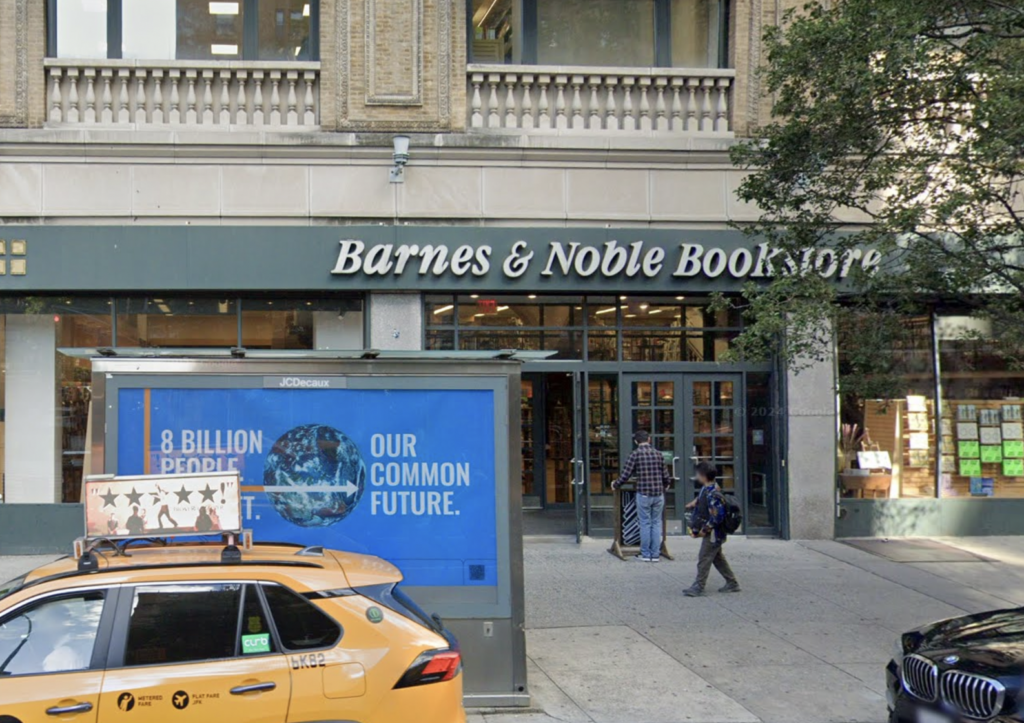
By Gus Saltonstall
Workers at the Upper West Side Barnes & Noble are officially unionized.
The Upper West Side outpost, on West 82nd Street and Broadway, along with Barnes & Nobles in Union Square and Park Slope, became the first locations of the book retailer in the United States to unionize, the Retail, Wholesale and Department Store Union announced on Thursday.
Following a roughly two-year push to unionize, workers at the three New York City locations signed a three-year contract last week that included some of the following agreements.
- Wage increases: Raised the minimum wage by $4, and general wage increases per year.
- Union healthcare coverage.
- Safety equipment: Back braces, wrist guards, anti-slip mats, stools for workers to sit at information desks and cash registers, and also on the sales floor and cafe to allow workers to sit when relief is needed.
- Safety language: Including a safety committee, de-escalation trainings, the ability to walk away from unsafe situations without feat of reprisal, and a clear process of banning customers from harassing or behaving inappropriately.
- Late night transport: Paid auto transport during late inventory shifts.
- Seniority & Layoff protections/job security: If the store closes and relocates elsewhere.
- A new break room: A conference room will be turned into a break room for workers to have lunch.
- New trainings: Annual anti-discrimination and other trainings.
“I’m really excited to have a contract in place and to have a say in the conditions in which I work,” Eve Greenlow, a bookseller at the Upper West Side store, said in a news release. “To be a part of the first ever union contract with Barnes & Noble feels like I’m a part of history!”
In the winter of 2023, workers at the Upper West Side Barnes & Noble listed “job security, a lack of structure when it comes to job duties, and favoritism by management” as their central concerns surrounding their work.
The new union contract represents around 200 workers across the three New York City Barnes & Noble locations.
You can read more about the new union on the Upper West Side — HERE.
Subscribe to West Side Rag’s FREE email newsletter here. And you can Support the Rag here.









I am glad they have secured themselves protection of the store closes – though I worry that they have information indicating the store may close.
I also hope that the cost of the benefits are not going to be passed on to the consumer.
I am also glad they unionized. Better to buy from an indie bookstore.
Of course they will be passed along to consumers, not least in the form of a store location that will close. This is known as shortsighted workers killing the goose that lays the golden eggs.
Presumably a multibillion-dollar company like Barnes & Noble is smart enough not to negotiate a union contract that would cripple its business. I have faith that its executives know what they can and can’t afford better than we outsiders do.
Yes, Barnes & Noble, the giant multibillion company that barely made $3m in net profit in 2019…
Amazon made zero profit in 2022 — it actually lost $2.7 billion that year — but it was then (and is still) a giant multibillion-dollar company. I’m surprised you sing the praises of free markets yet don’t trust a company like B&N to make its own best decisions about labor contracts.
You vastly overestimate the margins and revenue of a bookseller. Barnes and Noble was taken private in 2019 for $600M. That means their sales were (and are) hardly in the billions.
This is false and not how corporate valuations work. (B&N generated about $3.5 billion in revenue in 2019, the same year it was taken private for $683 million.)
It also neglects my larger point, which is that companies can and do protect their own interests in labor negotiations, so we don’t need to wring our hands that B&N and its workers reached a mutually agreeable contract.
Seriously? They’re going to charge above list for their books, magazines, games, etc?
The fact is that B&N has been eliminating purchase incentives (like 30% off best sellers) for years now.
Garbage. Book costs are set by the publishing companies, and not the store.
I’m trying to imagine you without the grit of sandpaper.
“Garbage”… Sam, again, as I pointed out the other week, why always being that rude and disrespectful with all your responses all the time?
Of course the increased expenses will be passed onto the consumer.
Then buy your books online. Barnes and Noble does not set the cost of books — the publisher does. The price is listed ON THE BOOK.
Why be so dogmatic? (And wrong.)
While publishers can suggest prices, they can’t always mandate prices. Their pricing strategy depends on whether the book is sold under the “wholesale model,” where they have less control, or the “agency model, where they have more control.
Under the traditional wholesale model, publishers sell books to retailers at a discount, and then retailers set the price for consumers. In this model, the publisher does not control the final retail price, only the wholesale price.
Expanded distribution paper books often seem to be sold via the wholesale model. The wholesale model explains why you might see Barnes and Noble selling a paperback at a massive discount. Under the wholesale model, if they want to lose money selling a book, they can. If they want to sell a book at a premium, they can. The publisher is paid the wholesale price regardless of how Barnes and Noble prices your book for the reader.
Under the agency model, publishers set the retail price, and retailers act as “agents” who sell the book to consumers at that price. Retailers get a commission for each sale, but the publisher controls the price.
OK THANK YOU SAM (…)
Yes, the hard and dangerous factory job of selling books. I am glad they managed to get safety equipment… This list of negotiated items read like an article from the onion… This city used to be for the tough ones, now its just a weak and lazy mass of “workers”.
West Side Rag should do a story on the years-long efforts of workers at Trader Joe’s to unionize.
Jerome, it does actually take “tough ones” to unionize in the current climate, particularly when it’s a giant corporation on the other side of the table.
Also, it conveys a lack of actual retail experience to mock the idea that workers might benefit from, for example, back braces and anti-slip mats when moving heavy boxes of books around to unload shipments and restock shelves.
A case of books from a publisher can weigh 40-50 pounds, which is at the upper limit of what even retailer trade groups recommend as a maximum lifting load. You can’t be weak or lazy to deal with those kinds of weights all day, and it’s certainly not weak or lazy to want to protect one’s self against injury while doing it.
Yes it is weak and lazy to always need or want to depend on unions to value or protect your job. That is a personal opinion, of course. To each their own I guess. I am always amazed to see how anti business or anti free market this UWS neighborhood is.
We’re not anti business. We’re pro labor. Trade unions give working men and women a better chance at a fair deal. You think the ownership class looks out for the BBC workers?
So the $20 back braces and $80 stools the company will have to buy will break it?
Your takeaway isn’t ‘wow, they were too cheap to give their workers stools to sit on?’
Perhaps that’s a reason the workers unionized?
Did you ever run a business?
Spoken like a true Pinkerton. The city used to be made of tough ones who were in, wait for it, unions. Your scrappy grandfather who used to wake up at 4 to go work as an iron worker wouldn’t have settled without any union protections, so why should his granddaughter?
This sounds noble and high ground-ish but is actually poorly reasoned. Public sector unions have tax payer workers negotiating not with fat cat captains of industry but (checks notes) fellow taxpayers who voted in the govern with which the unions are negotiating. But even in private sector – Labor and insurance and health laws and jurisprudence have greatly improved workplace climates and protections without need for unions to step in- this is not the 1940s. Moreover, People and jobs today are much more mobile. Unions today also spend a huge amount of dues on political goals their members don’t support – think about how vast the union anti Kamala sentiment had to be for certain unions reluctantly not taking a stand instead of automatically endorsing. That was the best the union leaders could do with worker dues – so concerns with how are spent is yet another reason why so few workers find unions a good idea these days and why most unions are dramatically shrinking. Unions are not necessarily wonderfully valuable to the worker in the modern era.
Because selling books isn’t comparable to being an iron worker. I guarantee you that this city wasn’t built by implementing “safety language”, whatever that means, or annual anti-discrimination trainings…
Am I the only one who was reminded of the safety dance by men without hats ?
Work, is work, is work. Everyone deserves safety. Everyone.
Jealous of organized labor? How sad. Absolutely everything you have on the job was brought to you by labor unions — sick pay, holidays, bathrooms, health care, safety regulations (carpal tunnel is a real thing, by the way) … and I could go on, but America does not teach labor history.
Yes, America does teach us labor history, it mostly falls under the mob/gangster chapter…
Then you haven’t even learned the basics of labor history. Too bad your parents didn’t teach it to you. Those of us who had parents who were trade unionists learned the truth
Unions created the so called middle class in the US. We b should go back to calling it the working class.
Everything I have on the job was brought to me by me. I am my own boss and run my own business. And I take pride to always work with non union vendors and contractors. Hiring an electrician to fix an outlet in a NYC office should not cost you $500 because of the extravagant union cost and 3hrs minimum work rule.
America does not teach labor history because we are not France and a majority here will always stand against labor unions. Go be a socialist somewhere else.
Well, doesn’t fix the horrid new layout of the W83rd Street store’s second floor, but good for the employees.
Does the medical plan include vision and dental? Is there a pension plan?
Now, if only they’s stop serving Starbucks.
Agree. I can’t find anything anymore on the 2nd floor.
And there’s no natural light, except at the Starbucks end of the floor.
It’s bad clothing retailing design theory.
bye bye barnes and noble
The Strand has been union for decades, and no the Strand has NOT owned the main building for 100 years.
Yes they do own the building today. The family moved the Strand to its current location in 1957 and rented space for decades before buying the building in 1996 for $8.2 million.
I’m amazed the building it’s in hasn’t been replaced by a condo tower yet.
Zabar owned. (Saul I believe, and he’s not interested in seeing that kind of building put up.)
For the right price, everyone is interested.
Argh another decrepit 2 story building blighting our neighborhood, I should have known the Zabars were behind this tragedy.
These B&N stores will be joining Shakespeare & Co on the ‘closed storefront list’ within 3 years. I guarantee it.
You would be right. But the playing field is being dramatically leveled by the new federal administration. And bravo for that.
Bring back Main Street and we all benefit. Corporate slave owners can go down with their free trade ships. “Afuera”
This means job cuts and higher prices for customers.
Books stores work generally have minimal profits and most barely get by. Even for chain books stores it’s a tough road that’s why most have gone out of business. Saddling B&N with union wages and rules are a sure way to put the company in a precarious state of survival.
Yeah, no reason employees shouldn’t live in desperate straits. /s
B&N was bought by private equity in 2019, it’s now totally opaque.
A problem with private equity ownership is the sad history of such companies stripping things to the bone, saddling what’s left with huge and expensive debt, then bailing.
And workers know this, which is a reason they organize.
By the way, the organizing and negotiation process lasted about 3 years. In that time, per labor law, few if any increases were given. So the $4/hour minimum increase, up front with the new contract, is much smaller than might appear.
I can’t see these additional costs for the company being any additional incentive to keep underperforming locations open
I love B&N,go there often.Brings intellectual class to the neighborhood.
Sounds good for the workers right now. So, when will the store close?
Oh man… I bet this store closes down and they all lose their jobs now.
Yet another reason not to shop at B&N anymore.
Interesting all the complaints here – why shouldn’t these workers (all workers, really) be entitled to better wages, benefits, and treatment? If I have to pay a little extra for my book so that the folks stocking the store and running the register can actually live on their wages, so be it. Why go after the workers and not the corporation behind them? Maybe the CEOs could make a little less to keep prices down for consumers instead?
Its a free job market, go work somewhere else if you are not satisfied at your current job.
Jeez – all the negativity piling on to folks who just won the right to a protected say in their working lives. Bet none of these old grumps even buys a book to read. Right on, B&N and employees! Thank you for your service.
Its not about negativity, its about believing or not in capitalism and free market.
Well done to Unionization of Barnes and Noble workers! While this may lead to increased prices for consumers (why not against profits) I don’t think workers should “subsidize” profit margins and consumers by foregoing fairer wages and work conditions.
If a business can’t afford to stay open due to a requirement of having to pay their employees a proper salary with benefits, then that business doesn’t deserve to be in operation. Let the “free market decide,” as a lot of you are wont to say.
Does this apply to all businesses? Including all the bodegas and restaurants that employ illegals? Or do they not count?
All businesses.
I’m glad they unionized.
“Capital organizes and therefore labor must organize.” – Teddy Roosevelt, 1912
What happened to that pizzeria in Brooklyn that formed a union?
The store has already cut back on the number of workers. Cash registers on the 2nd floor are unattended at night. Unionization will prove to be shortsighted..
Oh great. More communism in the name of safety. Just what New York needs.
This is so awesome, bravo.
What is a book?
Asking for a friend, Mayor Eric Adams.
Thank you and have a blessed day!